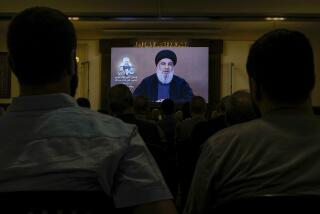Threats Will Outlast War
- Share via
The closer Osama bin Laden comes to being cornered, the greater our concern should be about his potential use of weapons of mass destruction as a final act of defiance and punishment of America.
Surprisingly, in his recent interview published in the Pakistani paper Dawn, Bin Laden avoided issuing a last-resort warning. He used very precise language, which when examined offers a better understanding of what he may be capable of doing.
Instead of threatening to unleash chemical or nuclear weapons if the U.S. tried to finish him off, he is quoted as saying that “if America used chemical or nuclear weapons against us, then we may retort with chemical or nuclear weapons. We have the weapons as [a] deterrent.”
By issuing threats against improbable U.S. actions, Bin Laden is escaping the need to deliver on his warnings. But even a bluff carries with it messages.
In this case, his bluff is meant to signal that his war on the U.S. is far from over. His boasting is also meant to shore up the morale of his followers who might be contemplating defection and contributing to his capture. Indirectly, his words are an appeal to recruits by flaunting his powers.
This does not mean that Bin Laden lacks crude weapons of mass destruction or the will to use them first, mainly to spread panic. After all, he intentionally did not mention biological weapons as part of his “deterrent” arsenal.
But Bin Laden’s failure to issue a general warning against any U.S. attempt to eliminate him could also be a sign that he is confident of his survival.
Bin Laden’s benefactor, Taliban chief Mullah Mohammed Omar, told the BBC last week that the loss of this or that territory in Afghanistan is of no consequence.
“The real matter is the extinction of America,” he said.
According to Omar, “The plan [to destroy America] is going ahead and
This comment would suggest that the Taliban and Bin Laden have prepared plans to continue the war against the U.S. even after they had been ousted from power.
Such a scenario would be of much interest to Iraqi leader Saddam Hussein. Baghdad was unnerved by the continued speculation that the U.S. might turn its attentions to Iraq after it solved the Bin Laden-Taliban problem.
Iraqi Deputy Prime Minister Tarik Aziz told the London Telegraph on Oct. 28, “We know it is just a matter of time before such an attack.”
Baghdad must be hoping more than ever that Bin Laden orchestrates further attacks on America proper and gets the United States bogged down in a guerrilla war in Afghanistan.
As Hussein reportedly said during a Cabinet meeting last week, “the battle will not finish and if they set up a government or an alliance [to rule Afghanistan], it will fail.”
By supporting the Bin Laden-Taliban war against the U.S., Hussein would hope to buy time.
For example, the Baghdad paper Babel, which is published by Hussein’s son Uday, reported on Nov. 7 that the Iraqi president told senior leaders of Iraq’s Nuclear Energy Authority and its military industry that when one “has a big objective,” nothing will divert him from his goal. “Progress has continued and will accelerate,” the paper quoted Hussein as saying.
A U.S. that is militarily preoccupied in Afghanistan frees Iraq’s hands against its internal and external enemies.
A front-page editorial in Babel on Nov. 10 warned Turkey that it would be making “a grave mistake” if it participated in any U.S. attack against Iraq.
Subsequently, the Ankara-based Turkish Daily News reported that Iraq has amassed forces in the north in what could be an imminent confrontation with Kurdish separatists.
It is apparent, therefore, that Bin Laden’s capture or elimination--even at the risk of him turning to his weapons of last resort--is the lesser of the evils.
If he remains at large and regroups, he would continued to pose a direct threat to America.
Moreover, his potential to serve as a geopolitical distraction would surely be instrumental in furthering the designs of even more dangerous enemies of the United States.
More to Read
Sign up for Essential California
The most important California stories and recommendations in your inbox every morning.
You may occasionally receive promotional content from the Los Angeles Times.













